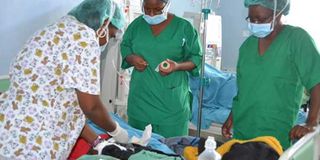More diagnosed with kidney diseases as NHIF pay-outs rise

Doctors prepare to start dialysis services on a patient at the Chuka County Referral Hospital in Tharaka-Nithi County on October 11, 2016. PHOTO | FILE | NATION MEDIA GROUP
What you need to know:
- It is estimated that 50 million people worldwide have kidney diseases due to various causes.
Chronic kidney diseases (CKD) cause at least 2.4 million deaths per year and are now the sixth fastest growing cause of death.
While the increase in NHIF payouts mean that more patients are accessing the much-needed treatment.
Men are more at risk of kidney diseases mostly because they engage in risky lifestyle behaviour and seek treatment late.
As the world marked international Kidney Day on Thursday, experts said that kidney diseases are so prevalent in some counties than others due to high cases of diabetes and hypertension.
“Overall, women have more burden but unfortunately more men get transplanted than women world over,” explained Dr John Ngigi, who heads Kenyatta National Hospital’s renal unit in an earlier interview.
COMPLICATIONS
It is estimated that 50 million people worldwide have kidney diseases due to various causes. Chronic kidney diseases (CKD) cause at least 2.4 million deaths per year and are now the sixth fastest growing cause of death.
This year’s theme, "Kidney health for everyone everywhere", aims to highlight the growing burden of kidney diseases.
Kidneys essentially filter toxins from the body. They also play an important role in maintaining the good functioning of the urinary system.
When the kidneys are affected and when they stop functioning properly, an individual could suffer from a number of conditions like chronic kidney disease and acute kidney failure, among other complications.
Acute kidney injury (AKI), an important driver of CKD, affects over 13 million people worldwide and 85 per cent of these cases are found in low and middle-income countries. Around 1.7 people are estimated to die annually because of AKI.
The Kenya Renal Association estimates that the number of patients on chronic haemodialysis — a treatment that filters and purifies the blood using a machine —in both private and public hospitals has increased by eight times from 300 in 2006 to 2,400 in 2018.
DIALYSIS
Dialysis helps keep the body’s fluids and electrolytes balanced when the kidneys can no longer function normally.
Through the procedure, the body’s fluid balance is maintained by the removal of waste, extra water and salt to ensure they do not build up to dangerous or harmful levels.
The process also helps maintain a safe level of certain chemicals in the blood, such as potassium, sodium, and bicarbonate, and helps to control blood pressure in the process.
In the past years, the National Hospital Insurance Fund (NHIF) has made significant progress in supporting patients with chronic kidney disease, with payouts for treatment of kidney failure last year, increasing by 41 per cent, seeing the insurer pay up to Sh1.8 billion for dialysis.
This was an increase from Sh1.24 billion spent in the 2016/2017 financial year, highlighting the burden of the procedure to insurers.
TRANSPLANTS
While the increase in pay-outs mean that more patients are accessing the much-needed treatment, Dr John Ngigi, the Head of Renal Unit at the Kenyatta National Hospital, says that there are still many more who are not on treatment. The increased payout could also mean that there is a slight increase in patients being diagnosed with end-stage kidney failure due to rise in non-communicable diseases like diabetes and hypertension.
Currently, it is estimated that between 2,000 and 2,500 patients are on dialysis in the country, against 10,000 who have been diagnosed with end-stage kidney disease, explained Dr Ngigi.
“I am not surprised that the figure [NHIF payout] has gone up because we have more dialysis centres and equipment across the country and more patients are able to access treatment,” he said.
A scrutiny of the benefits package utilisation report also shows that in the last half of 2018, NHIF paid a further Sh64.7 million towards kidney transplants, up from Sh21.7 million the previous year.
This makes the procedure one of the top expenditure items in the health care benefits package, marking an increase of Sh520million, up from Sh 1.24 billion spent in the 2016/2017 financial year.





